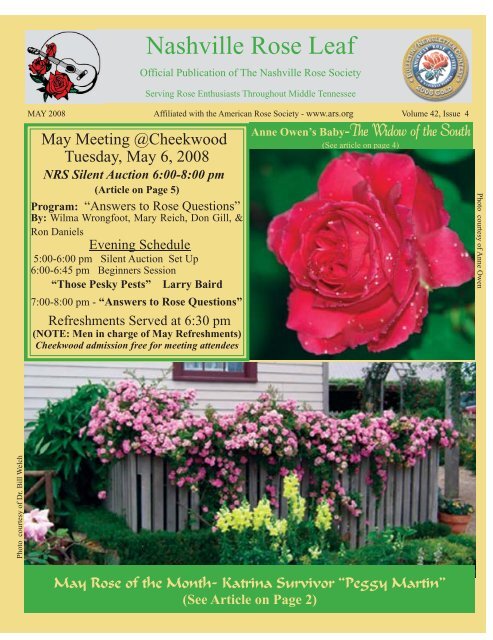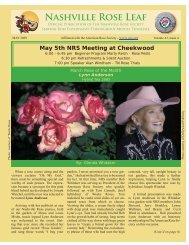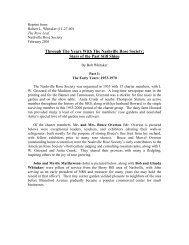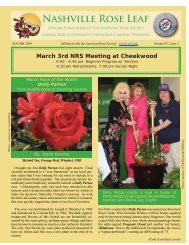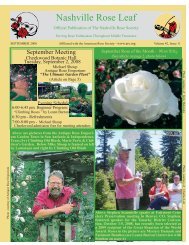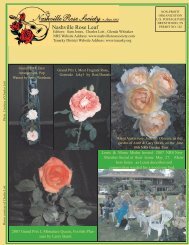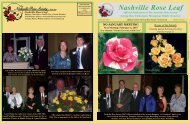May - Nashville Rose Leaf - Nashville Rose Society
May - Nashville Rose Leaf - Nashville Rose Society
May - Nashville Rose Leaf - Nashville Rose Society
Create successful ePaper yourself
Turn your PDF publications into a flip-book with our unique Google optimized e-Paper software.
Photo courtesy of Dr. Bill Welch<br />
<strong>Nashville</strong> <strong>Rose</strong> <strong>Leaf</strong><br />
Official Publication of The <strong>Nashville</strong> <strong>Rose</strong> <strong>Society</strong><br />
Serving <strong>Rose</strong> Enthusiasts Throughout Middle Tennessee<br />
MAY 2008 Affiliated with the American <strong>Rose</strong> <strong>Society</strong> - www.ars.org Volume 42, Issue 4<br />
<strong>May</strong> Meeting @Cheekwood<br />
Tuesday, <strong>May</strong> 6, 2008<br />
NRS Silent Auction 6:00-8:00 pm<br />
(Article on Page 5)<br />
Program: “Answers to <strong>Rose</strong> Questions”<br />
By: Wilma Wrongfoot, Mary Reich, Don Gill, &<br />
Ron Daniels<br />
Evening Schedule<br />
5:00-6:00 pm Silent Auction Set Up<br />
6:00-6:45 pm Beginners Session<br />
“Those Pesky Pests” Larry Baird<br />
7:00-8:00 pm - “Answers to <strong>Rose</strong> Questions”<br />
Refreshments Served at 6:30 pm<br />
(NOTE: Men in charge of <strong>May</strong> Refreshments)<br />
Cheekwood admission free for meeting attendees<br />
Anne Owen’s Baby-The Widow of the South<br />
(See article on page 4)<br />
<strong>May</strong> <strong>Rose</strong> of the Month- Katrina Survivor “Peggy Martin”<br />
(See Article on Page 2)<br />
Photo courtesy of Anne Owen
Editor’s Desk<br />
Sunday afternoon, March 9, 2008,<br />
Jim Ruppert called and we talked<br />
about the wording for the bench to<br />
be placed at Cheekwood Botanic<br />
Gardens in memory of his wife Shirley<br />
who died suddenly of a stroke last<br />
June. Early the following Tuesday<br />
morning I received an email from<br />
Anne Owen informing me of Jim’s<br />
tragic death in an auto accident. The<br />
wording for the plaque on the bench<br />
has changed and now it will be in<br />
memory of both Shirley and Jim.<br />
They were two gracious people and<br />
their presence and engaging smiles<br />
will be missed by friends and members<br />
of <strong>Nashville</strong> <strong>Rose</strong> <strong>Society</strong>. A<br />
passion for roses led both to become<br />
American <strong>Rose</strong> <strong>Society</strong> Consulting<br />
Rosarians. They hosted several NRS<br />
picnics at their lovely home on Harding<br />
Road, and <strong>Nashville</strong> <strong>Rose</strong> <strong>Society</strong><br />
had a standing, free reservation<br />
at their <strong>Rose</strong> Garden B & B anytime<br />
one of our out-of-town guest speakers<br />
needed overnight accomodations.<br />
The Ruppert’s untimely deaths reminds<br />
us of the uncertainty of the<br />
future. There is an urgency about<br />
life that requires us to attend to those<br />
matters that make a difference in our<br />
world. One of the best ways rosarians<br />
can make a difference is by<br />
sharing roses and rose knowledge<br />
with others.<br />
— Charles Lott<br />
NRS Patrons<br />
Our thanks to the following businesses<br />
and foundations who have<br />
made sustaining donations to support<br />
the educational programs of<br />
<strong>Nashville</strong> <strong>Rose</strong> <strong>Society</strong>:<br />
Houghland Foundation<br />
SunTrust Bank<br />
NASHVILLE ROSE LEAF,MAY 2008 2<br />
<strong>Rose</strong>s of the Month<br />
Katrina’s Survivor <strong>Rose</strong> - ‘Peggy Martin’<br />
(Pictures on Front Cover)<br />
There are at least two good things that<br />
came out of Hurricane Katrina. One is<br />
Mrs. Peggy Martin, and another is a very<br />
special rose. For many years, Peggy<br />
Martin has been an active member of the<br />
New Orleans Old Garden <strong>Rose</strong> <strong>Society</strong>.<br />
In 1989, a friend of Peggy’s gifted her<br />
with a hand-me-down rose cutting. It had<br />
come from a friend, who had received a<br />
cutting from another friend, who had received<br />
a cutting from another friend, you<br />
get the idea. Peggy planted it near an old<br />
shed at her home, and within a few years,<br />
the vigorous climbing rose graced the<br />
old building with pink clusters of flowers<br />
and long, flexible, nearly thornless<br />
canes. This previously unnamed rose<br />
has been merrily growing there for nearly<br />
20 years.<br />
During a visit to the Martins’ home in<br />
2003, Dr. William C. Welch, noted Texas<br />
Cooperative Extension horticulturalist,<br />
top rose expert and aficionado, admired<br />
this climbing rose that was covered in<br />
slightly fragrant pink “nosegays” and<br />
whose foliage was bright green and clean.<br />
Peggy graciously gave him several cuttings,<br />
which he took home and planted<br />
along a picket fence. Dr. Welch was<br />
pleasantly surprised by the rose’s vigor,<br />
health and disease-resistance, but thought<br />
little more about it because he assumed it<br />
was a mid-spring “once bloomer.” As he<br />
continued to observe the rose, he discovered<br />
that as the plant matured, it would<br />
have a second bloom cycle in autumn.<br />
Meanwhile, back in Louisiana in 2005,<br />
the unthinkable happened: Hurricane<br />
Katrina. Peggy Martin and her husband<br />
M.J. lost their home, the commercial<br />
fishing boat M.J. used to supplement<br />
their income, and most tragically, both<br />
of Peggy’s elderly parents, who perished<br />
in the subsequent flood. Approximately<br />
twenty feet of salt water covered the<br />
Martins’ entire property for two weeks.<br />
Their sadness and loss was overwhelm-<br />
Announcing<br />
<strong>Nashville</strong> <strong>Rose</strong> <strong>Society</strong><br />
2008 Photo Contest<br />
See Insert Sheet for Details<br />
ing. When the Martins were finally able<br />
to return to their home, it was obvious<br />
that all her beautiful garden plants were<br />
also lost. As she absorbed the devastation,<br />
walking slowly around her property,<br />
she was utterly shocked to see two plant<br />
survivors--one of which was the pink<br />
rambling rose, still bearing lush growth.<br />
Dr. Welch fretted about the fates of his<br />
many friends in New Orleans in the aftermath<br />
of the hurricane. When he was<br />
finally able to reestablish communication<br />
with the Martins, and he was both<br />
relieved and saddened. As they talked,<br />
he inquired after their home and garden,<br />
and Peggy shared miraculous story of the<br />
rose. Like Peggy, this rose is a tough, true<br />
survivor. Dr. Welch named the rose in her<br />
honor, and worked with nurseries to start<br />
a small crop of roses from the cuttings,<br />
making the ‘Peggy Martin’ rose available<br />
to the public, currently limited to just a<br />
few growers. These growers are generously<br />
donating $1 per plant to the Greater<br />
Houston Community Foundation, with<br />
the purpose of assisting in the task of restoring<br />
gardens, green spaces and parks in<br />
New Orleans, Beaumont and other hard<br />
hit Gulf Coast locations. With its good<br />
looks and healthy vigor, the “Peggy Martin<br />
<strong>Rose</strong>” is well on its way to becoming a<br />
classic garden mainstay for those wanting<br />
a climber that is thornless, with abundant<br />
pink clusters of small flowers.<br />
If you are looking for a gorgeous and<br />
vigorous (12-to-15 feet) pink climbing<br />
rose for arbors, fences or walls, I encourage<br />
you to try ‘Peggy Martin.’ (Personally,<br />
I ordered two ‘Peggy Martin’ roses,<br />
which will join the ‘Lavender Lassie’ roses<br />
on my arbor.) You can look forward to<br />
spending many years with this symbol of<br />
hope, resurrection, and the will to survive<br />
and thrive against all odds. It’s a great<br />
rose AND a great cause.<br />
You can order your own Peggy Martin<br />
rose from Petals from the Past, Inc, Jemison,<br />
AL (205) 646-0069, www.petalsfromthepast.com;<br />
The Antique <strong>Rose</strong> Emporium,<br />
Brenham, TX, (800) 441-0002,<br />
www.antiqueroseemporium.com; or<br />
Chamblee’s <strong>Rose</strong> Nursery, Tyler, TX,<br />
(800) 256-7673, www.chambleeroses.<br />
com<br />
— Leann Barron
THE BEGINNING ROSARIAN<br />
<strong>May</strong>—A Month for Growing, Working, and Blooming<br />
<strong>May</strong> can be a busy and rewarding time in<br />
your rose garden. Because nature, herself, is<br />
working so hard, clothing your bushes with<br />
abundant growth, clean leaves, vigorous<br />
stems, and buds popping out at the ends of<br />
almost all new canes, it is tempting to sit back<br />
and “leave the gardening to her.” After all<br />
the tiresome digging, planting, pruning, raking,<br />
uncovering, weeding, fertilizing, and watering<br />
in April, it looks like <strong>May</strong> is the month<br />
to “turn’er loose and let’er go.”<br />
Don’t be fooled. Nature is doing a good job,<br />
but so must you! Otherwise you will be disappointed<br />
by the time the month is gone and the<br />
beetles begin arriving in June. In order to enjoy<br />
a beautiful, pleasurable rose garden, there<br />
is still much work to do in <strong>May</strong>. Now is the<br />
time to makeplans, albeit much of what you<br />
do will be cooperating with nature. Ths is the<br />
beauty and joy of rose gardening in <strong>May</strong>.<br />
As much exciting growth is discovered in<br />
your garden every day, here are some tasks<br />
you still must diligently work at this month:<br />
The first is to continue regularly spraying<br />
your roses. How hard can that be? You will<br />
need to spray two or three times this month at<br />
the most. The key is to spray your rose bushes<br />
in <strong>May</strong> whether it looks like they need it or<br />
not. Come June and July, you will find out<br />
why, when you notice that those new, clean<br />
green leaves of spring are looking not only<br />
dingy, and some a turning yellow or having<br />
black spots. By then, you will have a fullblown<br />
case of “black spot” in your garden,<br />
which can be doubly discouraging during the<br />
hot, sticky summer months. It is even more<br />
tempting to blame nature, when you have little<br />
to admire from your favorite window. The<br />
real culprit is not mother nature, it is the gardener<br />
who who failed to give attention during<br />
the rosy month of <strong>May</strong>.<br />
What, when and how should I spray? The<br />
number one reason to spray is to rid your<br />
roses of the dreaded black spot fungus. You<br />
should spray at two-week intervals, using an<br />
inexpensive one or two-gallon pump sprayer<br />
(avaliable a local garden centers or online),<br />
spray your “clean” bushes with two substances<br />
that you can mix together: one for<br />
the leaf surface, and the other for penetrating<br />
the foliage itself. One is “topical” and the<br />
other is “systemic.” When used together, or<br />
alternatively, at two-week intervals, during<br />
<strong>May</strong>, you will avoid a lot of disappointment<br />
come really hot, muggy summertime. [Refer<br />
to the spray reference chart included as an<br />
insert with this newsletter.] The spray ref-<br />
By Sam Jones<br />
erence gives a list of recommended products<br />
for both fungal treatment and chemicals that<br />
can be used to rid your roses of various pests.<br />
If you have questions about what products to<br />
use contact any Consulting Rosarian (see list<br />
on page 7). Be sure to attend the <strong>May</strong> meeting<br />
when a panel of outstanding rosarian will<br />
answer your questions.<br />
You already know that water is a must for<br />
roses. However, you can also SPRAY your<br />
roses with water, not only to hydrate the foliage<br />
during dry spells, but you can also effectively<br />
water-spray away the most troublesome<br />
insects you might encounter during this<br />
month, as well as most of the summer. The<br />
two insects you are most likely to see in <strong>May</strong><br />
are first, aphids—little green, sticky devils<br />
that almost cover the ends of your luscious<br />
new stems and buds. Secondly thrips, almost<br />
invisible varmints nesting in blooms that turn<br />
lighter-colored-rose petals brownish.<br />
With an inexpensive, adjustable garden hose<br />
sprayer nozzle on a wide-fan or an angle setting,<br />
you can spray away those bothersome<br />
aphids. Once or twice in several days and<br />
they will virtually disappear. Thrips require<br />
something stronger, but don’t bother with<br />
them unless you really want only pristinewhite<br />
blooms. If you do, then mist-spray<br />
only the buds (not the whole bush) before<br />
or soon after they open with an “insecticide”<br />
(Orthene is a good choice), and they will soon<br />
made themselves scarce. Be careful. Many<br />
insects help you. Don’t try to kill them all—<br />
only a very few are bad ones.<br />
If you have planted bushes near a sunny,<br />
brick wall—you may notice that you bottom<br />
leaves are looking gray and beginning to drop,<br />
in spite of your faithful fungus applications.<br />
You could have an infestation of spider mites<br />
(hard to see with the naked eye). But before<br />
purchasing expensive chemicals to eradicate<br />
these critters, I would suggest you turn your<br />
trusty water-hose nozzle on them, as well.<br />
Repeated hard water-spraying from the bottom<br />
of the bush upward several times over a<br />
couple of weeks, and these babies won’t stick<br />
around. They hate water. Use it often and<br />
use it well.<br />
What’s left for <strong>May</strong>? If you have cooperated<br />
well with nature’s flush and profusion of<br />
blooms toward the end of the month, let me<br />
entice you to cut some of the most attractive,<br />
as well as fragrant, blooms. Don’t worry a lot<br />
about shape; just find the ones that are most<br />
appealing to you. Cut them, and if you want,<br />
share some with a friend and certainly with<br />
President’s Column...<br />
April showers will bring <strong>May</strong> flowers, is<br />
the standby saying for spring. If all of April<br />
is like the first four days,<strong>May</strong> should bring<br />
some amazing flowers. <strong>May</strong> is a great time<br />
to set aside a weekend for a rose show. Most<br />
major cities within three hours of <strong>Nashville</strong><br />
have a spring rose show each year.<br />
If you grow roses and purchase a new<br />
plant or two every year, I strongly urge you<br />
to go see a rose show. There is no other place<br />
one can go to see so many new varieties of<br />
hybrid teas, miniatures and shrubs. The pictures<br />
in the books and catalogs really do not<br />
do the real thing justice. In addition to seeing<br />
the real thing you get a chance to talk to<br />
people about how it grows. The bloom you<br />
see may be the only one that looked good the<br />
whole year and the catalogs are not going to<br />
tell you that.<br />
Speaking of new roses our own Anne<br />
Owen has just received a silver certificate<br />
from the ARS rose trials for a rose she has<br />
created. She volunteers at the Carnton Plantation<br />
and is going to name the rose The Widow<br />
of the South. I am not sure yet when the<br />
rose will be available for people to grow. I<br />
believe Anne may enter it in a few more rose<br />
trials to see how it does in other parts of the<br />
country. Congratulations to Anne!<br />
At the end of <strong>May</strong> we will have our annual<br />
garden tour. This year we are going to try<br />
something a little different and have some<br />
food and drinks available along the way. We<br />
have three gardens on tour this year, all very<br />
different—Music City Garden, a new public<br />
rose garden in downtown <strong>Nashville</strong>, and the<br />
private gardens of Sam and Nancy Jones and<br />
Jerry and Marise Keathley. (see article on<br />
page 4 for addresses.<br />
—Jeff Harvey<br />
So many plants, so little space<br />
your spouse, but let me lure you into taking<br />
a small step you never thought you would.<br />
Consider taking some to a—<strong>Rose</strong> Show.<br />
Don’t let those capitalized two words intimidate<br />
you. There is not a “Rosarian” alive<br />
that did not start out where you are. Yes, take<br />
some of your roses, the ones that look the best<br />
to you, to a rose show—there are a number<br />
of rose shows in the spring and fall within a<br />
few hours driving distance of <strong>Nashville</strong>. The<br />
Tenarky District show will be October 4th,<br />
at Cheekwood. Everyone starts as a “novice.”<br />
You will be surprised at how many “old<br />
hands” will assist you. They have all been<br />
right where you are. I can say this, once you<br />
show roses the first time, you will do it again.<br />
It’s fun and you will be hooked. But it’s all<br />
about enjoying roses and helping others enjoy<br />
them, also.<br />
3 NASHVILLE ROSE LEAF, MAY 2008
A Star Is Born<br />
By Anne Owen<br />
Isn’t that what every mother says of her<br />
children?<br />
In 2003, I wanted to hybridize a rose to<br />
be named for Historic Carnton in Franklin,<br />
Tennessee. Initially, I asked Robbie<br />
and Marsha Tucker to do it, but Marsha<br />
convinced me that I could learn the<br />
procedure in about five minutes. With<br />
the patience and tutelage of Robbie and<br />
Marsha, I had a good crop of hips that<br />
produced seedlings blooming in the<br />
spring of 2004.<br />
One of the crosses I was most excited<br />
about was Madame Isaac Pereire x<br />
Knockout. My goal was to have a rose<br />
with the disease resistance of Knockout<br />
and the fragrance and higher petal count<br />
of Madame Isaac Pereire. That cross<br />
yielded two seedlings that were kept for<br />
further evaluation.<br />
Through all of 2004, the seedlings were<br />
kept in pots, and in the spring of 2005<br />
they were large enough to be planted in<br />
the ground. The roses were not sprayed<br />
for fungal diseases and while both were<br />
disease resistant, one proved to be more<br />
highly disease resistant than the other.<br />
That seedling was given the study name<br />
of ‘Carnton’.<br />
In addition to exceptional disease resistance,<br />
other characteristics this rose<br />
inherited from Knockout are the selfcleaning<br />
nature and continuous bloom.<br />
From Madame Isaac Pereire, the rose<br />
inherited fragrance, a petal count of<br />
40-50, and the medium pink color. It<br />
also roots very easily and grows well on<br />
it’s own roots.<br />
In 2006, I submitted two plants to the<br />
American <strong>Rose</strong> <strong>Society</strong> Trial Gardens at<br />
Shreveport. Following a two-year evaluation,<br />
the rose won a Silver Medal Certificate<br />
and the two plants were planted<br />
in the ARS Winner’s Garden. The rose<br />
will be registered this year with the name<br />
The Widow of the South.<br />
The University of Tennessee has field<br />
trials for disease resistant roses. Hopefully,<br />
they will have room to test this<br />
rose in their five year trial in the future.<br />
Hybridizing roses has been a very exciting<br />
project, and unlike other plants,<br />
you get to see the bloom of a new rose<br />
within several months of planting the<br />
seed.<br />
I encourage anyone who grows roses to<br />
try hybridizing! (See picture on page 1)<br />
Would You Like Coffee<br />
and Tea with Your <strong>Rose</strong>s?<br />
By Jean Bruce<br />
I love spring break. When most of my<br />
school colleagues are off to the ocean<br />
shore during spring break I bring a bit<br />
of the ocean to my door with the fresh<br />
smell of newly minted rose tea tonic and<br />
a cup of java to boot, without leaving<br />
Fairview TN!<br />
This week I started my spring tonic<br />
rose brew that gives me the wonderful<br />
salt-marsh aroma, without leaving<br />
Tennessee—there is nothing like a mix<br />
of alfalfa and fish emulsion in early<br />
spring. (I would not recommend mixing<br />
this mid-summer due to the intense<br />
TN heat—that might bring too much<br />
salt-marsh aroma into the air and create<br />
some very unhappy neighbors—experience<br />
talking here)<br />
After I’ve mixed up the tea I have to<br />
wait for a couple of weeks to use it, so<br />
then I turn to my coffee. With a covered<br />
cup of freshly brewed java for myself,<br />
I head back out to the garden to add 2<br />
cups of used coffee grounds around<br />
each bush (my local Starbucks is a great<br />
resource for this complementary spring<br />
pick-me-up). I normally begin to stockpile<br />
coffee grounds beginning in February<br />
so I have several bags available by<br />
mid-March. I toss the free bags into my<br />
freezer as I begin to collect so it prevents<br />
any chance of mold growing in the bags<br />
while waiting for spring break. A week<br />
before I’m ready to use them I pull them<br />
all from the freezer so the grounds aren’t<br />
frozen when I begin to work it into the<br />
soil. Coffee grounds are a mild source<br />
of nitrogen and also add organic matter<br />
to the soil, plus when it rains my garden<br />
has a fresh brewed aroma.<br />
Spring <strong>Rose</strong> Tea Tonic Recipe<br />
1 -32 gal trashcan with lid<br />
Fill the can almost to top with water<br />
Add the following:<br />
15 cups Alfalfa pellets<br />
2 cups Epsom salts<br />
1 qt- fish emulsion<br />
1 qt- liquid seaweed<br />
Stir every other day<br />
Let this mix for 2 weeks<br />
Feed 1 gal per bush<br />
Refill with water- let it sit another<br />
week or so<br />
Feed again, and spread remaining<br />
sludge around bushes<br />
I purchase the liquid seaweed from<br />
<strong>Rose</strong>mania, Epsom salts from the grocery<br />
store, and pellets and fish emulsion<br />
from a local feed and grain store.<br />
NASHVILLE ROSE LEAF,MAY 2008 4<br />
Welcome<br />
New Members<br />
Joanne Chandler<br />
P.O. Box 59564. 264 Harding Pl<br />
<strong>Nashville</strong>, TN 37205<br />
615-406-3601<br />
Karen L. Mikell<br />
1703 Waterford Rd.<br />
Murfreesboro, TN 37129<br />
615-893-1409<br />
Marion (“Kookie”) Liles<br />
3506 Echo Hill Road<br />
<strong>Nashville</strong>, TN 37215-2010<br />
615-383-2822<br />
Susie Epperson<br />
1515 Montvale Rd.<br />
Maryville, TN 37804<br />
865-984-4313<br />
Carol and Joe Holt<br />
2109 Remington Park Rd.<br />
Old Hickory, TN 37138<br />
615-847-2357<br />
Mrs. Joyce Grubbs<br />
6102 Highway 76 East<br />
Springfield, TN 37172<br />
(615) 384-2677<br />
<strong>Nashville</strong> <strong>Rose</strong> <strong>Society</strong><br />
2008 Spring Garden Tour<br />
Sunday, <strong>May</strong> 25, 2008<br />
1:00-6:00 PM<br />
The <strong>Nashville</strong> <strong>Rose</strong> <strong>Society</strong> 2008<br />
Spring Garden Tour includes three lovely<br />
rose gardens—one public and two private.<br />
The public garden is the all new<br />
Music City <strong>Rose</strong> Garden gracing downtown<br />
<strong>Nashville</strong> on 4th Avenue, South,<br />
across from the Country Music Hall of<br />
Fame (see article on page 5). The private<br />
gardens on tour are Sam and Nancy<br />
Jones, located at 130 Belle Glen Drive,<br />
<strong>Nashville</strong>, TN 37221 and Jerry and<br />
Marise Keathly at 5300 Lancelot Road,<br />
Brentwood, TN 37027. Refreshments<br />
will be served during the tour at the private<br />
gardens. NRS members and their<br />
guests are invited to enjoy this spring<br />
tour of rose gardens.
NRS Silent Auction<br />
Needs YOU!!!<br />
By Ron Daniels<br />
The NRS Silent Auction is not only one<br />
of our best fund raising events of the year<br />
it is a fun time for everyone. Two things<br />
must happen for the NRS Silent Auction<br />
to be successful: NRS members must<br />
bring items to be purchased and NRS<br />
members and their friends must come<br />
with checkbook in hand to make those<br />
purchases, Tuesday, <strong>May</strong> 6, 2008!<br />
Members, go out and solicit businesses<br />
you patronize and ask if they will donate<br />
something for the auction. Bring your<br />
own creations--craft items, plants, and<br />
food. This is not a garage sale so do not<br />
bring your old tires!<br />
Here are some steps to follow when bidding<br />
in a Silent Auction.<br />
1. Take note of all the items and list the<br />
ones that interest you.<br />
2. Know how much you are willing to spend<br />
at the auction and put a price beside the<br />
items on the list you made in step 1. If the<br />
total is more than you are willing to spend<br />
you will have to eliminate some.<br />
3. Write your bid on the bid sheet for the<br />
items you want (follow recommened<br />
minimum bid and increment)<br />
4. Go back periodically and check the price<br />
to see if anyone has outbid you on an<br />
item. If so you must decide if you want<br />
to raise the bid or forego this item. If you<br />
raise the bid be sure your total still matches<br />
your money.<br />
5. Wait until the end of the auction, pick up<br />
the items for which you were the winning<br />
bidder and pay the treasurer.<br />
Remember that <strong>Nashville</strong> <strong>Rose</strong> <strong>Society</strong> is<br />
a non-profit organization and fall under the<br />
federal guidelines for tax code 501c(3). This<br />
means that if you donate any items for sale at<br />
the Silent Auction, you can take a tax deduction<br />
for the fair market value of the item. The<br />
same is true for businesses, so if you ask for<br />
a donation, remind them of this. Also if the<br />
price you pay for any item purchased is higher<br />
than the fair market value you can deduct the<br />
difference as a donation to NRS.<br />
Last year and we raised over a thousand dollars.<br />
Let’s make the 2008 Silent Auction even<br />
better. If you want to help with set up or have<br />
any questions, contact me at (615) 330-7083<br />
or custrec@bellsouth.net.<br />
<strong>May</strong> <strong>Rose</strong> Tips<br />
Every rosarian has “tricks” they have learned that make gardening easier and more<br />
successful. How about sharing some of your “tricks” with others! Send your rose tips<br />
Griggs Guidelines for Happy <strong>Rose</strong>s<br />
1. Clean the beds. Remove the old mulch.<br />
2. Spray the beds for fungus spores that cause blackspot and mildew.<br />
3. Begin spray program for blackspot.<br />
4. Watch for early insects and spray if infested.<br />
A. Aphids -be alert for these tiny pests whic begin on roses in early spring as<br />
new growth emerges. Remember if using a systemic insecticide it should<br />
be applied early enough to be present in new growth. This is especially<br />
true if a ground application is used.<br />
B. Thrips are very difficult to control. Remove all infected buds and blooms<br />
and dispose of them. Contact spray can be used; however, it must be used<br />
before the thrips enter the bud. It takes about two days for thrips to complete<br />
a life cycle--so it will take several applications of insecticide for<br />
good control. Some references give early to midsummer as the time of<br />
most damage. My experience is they are from April to October.<br />
5. After everything is cleaned up apply new mulch.<br />
6. Use good rose movement practices, don’t get stressed out--Enjoy your roses!<br />
7. One last thing, don’t forget water if the weather is dry.<br />
— Charles Griggs, NRS Apprentice CR<br />
To take care of those pesky onions that crop up whereever they choose, use a tough<br />
rubber glove with a cotton glove over it. Soak the cotton glove with Round-up and<br />
start at the bottom of the onion and come up to the top with your gloved hand. This<br />
will kill the onion.<br />
— Kathy Brennan, ARS Consulting Rosarian,Member <strong>Nashville</strong> RS & TN RS<br />
If you like to design with roses you will need companion plants and filler material.<br />
Some of the best filler material are conifer (evergreen) branches. Evergreens can<br />
have a deep green to a yellow color. There are many that come in blue and even<br />
grey, Gray is a great unifying color and will blend in well with any color rose. It<br />
does not take many branches to fill in a design so you can start with a small tree.<br />
They will grow and you will have an abundance of replenishing filler material.<br />
Some more interesting conifers are the Pinus Parviflora (Japanese white pines)<br />
and Pinus Strobus (eastern white pine). These have long flowing needles. If you like<br />
dense evergreen, Pinus Thunbergia (the Japanese Black pine) is great. They have<br />
very thick upright growth patterns with thick candles.<br />
— Jeff Harvey, NRS President, ARS CR, Horticulture & Arrangement Judge<br />
Be sure to mulch the canes well on newly planted roses until new growth begins.<br />
Canes drying out in the sun and wind is the main cause of plant failure. Remove<br />
mulch carefully so as not to break off tender new shoots.<br />
— Marty Reich, ARS Master Rosarian<br />
If you should get stung by a bee or hornet, tape a copper penny to the area of<br />
bee sting and leave for 15 minutes. It seems the copper in the penny counteracts<br />
the poison of the sting, so carry a few pennies in your pocket to the garden in the<br />
future.<br />
— Glenda Whitaker, ARS CR Horticulture & Arrangement Judge<br />
<strong>Nashville</strong> Music Garden<br />
<strong>Rose</strong> Installation Ceremony<br />
There is no better way to welcome the tion, a special collection of roses named<br />
start of spring than by planting flowers! after artists, music industry leaders and<br />
The <strong>Nashville</strong> Music Garden, located at songs related to Music City USA. Plant-<br />
the corner of Fourth Avenue and Demoning of the roses is now complete and inbreun<br />
in the Hall of Fame Park, is a one cludes Barbara Mandrell, Amy Grant,<br />
of a kind rose garden that will honor both Dolly Parton, Lynn Anderson, Elvis,<br />
singers and songwriters synonymous Pam Tillis, Ring of Fire, Tennessee<br />
with <strong>Nashville</strong>’s Music Community. On Waltz, and Rocky Top installed along<br />
Thursday, March 6, 2008, the first two side Always Love You and <strong>Nashville</strong><br />
roses, Always Love You and <strong>Nashville</strong> <strong>Rose</strong>. There will be a formal dedication<br />
<strong>Rose</strong>, were installed in the 2,700 square- of the garden later in the year when the<br />
foot-honorary garden. The debut roses roses are in full bloom. (see picture on<br />
are part of the <strong>Nashville</strong> Music Collec- page 8)<br />
5 NASHVILLE ROSE LEAF, MAY 2008
1. By Leann Barron<br />
Ashdown <strong>Rose</strong>s: A World of Garden <strong>Rose</strong>s<br />
Paul Zimmerman stepped to the podium<br />
and began his program by saying: “A ROSE<br />
IS NOTHING MORE THAN A SHRUB<br />
WITH FLOWERS.” I sat up. What did he<br />
say? Who was this man? Was I in the wrong<br />
meeting? I looked around the room to make<br />
sure that I was, indeed, at the Tenarky District<br />
Winter <strong>Rose</strong> Workshop. Sure enough, my<br />
fellow rosarians sat listening intently, showing<br />
no outward reaction. Did they hear what<br />
he said? “A ROSE IS NOTHING MORE<br />
THAN A SHRUB WITH FLOWERS.” A<br />
million thoughts ran through my head, such<br />
as “How utterly true!” and “Then why are<br />
people so afraid to grow roses? They aren’t<br />
afraid to grow azaleas or hydrangeas.” I<br />
wanted to stand up and applaud.<br />
For the next hour, Mr. Paul Zimmerman,<br />
owner and CEO of Ashdown <strong>Rose</strong>s in Campobello,<br />
SC, passionately explained his nursery’s<br />
unique garden rose philosophy. Without<br />
a doubt, this man is in deep and abiding love<br />
with roses of all kinds. One of the few commercial<br />
nurseries in the country daring to go<br />
“green,” Ashdown has come a long way since<br />
its initial focus on antique roses. The nursery<br />
has evolved into offering and promoting really<br />
just one kind of rose — Garden <strong>Rose</strong>s,<br />
encompassing everything from antique to<br />
modern, climber to rambler, groundcover to<br />
shrub; and everything in between. Perhaps<br />
more importantly, they also represent roses<br />
that are easy to grow, lovely to behold and in<br />
truth, are nothing more than the most versatile<br />
of all flowering shrubs. The sheer versatility<br />
of roses even allows us to view them as<br />
companion plants. Imagine the possibilities.<br />
Paul Zimmerman wants you to think of them<br />
as flowering shrubs and vines to use in your<br />
garden and vase, alone or with other flowers<br />
and plants.<br />
Ashdown is proud to be one of the few commercial<br />
rose nurseries in the United States no<br />
longer using synthetic chemicals. Now before<br />
I lose some of you, let me offer a distinction.<br />
Most modern, exhibition hybrid tea roses are<br />
in a different “breed” and in general, require<br />
strict spray programs in order to win top rose<br />
show awards. Therefore, I do distinguish between<br />
Exhibition roses and Garden roses as<br />
described in this article.<br />
Ashdown’s philosophy emphasizes natural,<br />
organic, even old-fashioned garden practices,<br />
including the use of worm castings, mushroom<br />
and homemade composts, aged, unsterilized<br />
manures, and leaf mulches. Every<br />
rose on their 20 acres, from plugs to roses for<br />
sale to permanent plantings, is cared for using<br />
only organic and natural products.<br />
Paul suggests that there is some evidence<br />
that young roses left unsprayed develop their<br />
own immunities. Give your new garden roses<br />
a minimum of three years (unsprayed) to develop<br />
this immunity, and if it’s still diseased,<br />
shovel prune. Why toss the rose instead of<br />
spraying? He advises that if you are feeding<br />
your garden rose and it still isn’t doing well in<br />
your garden, it’s probably not well-suited for<br />
your area of the country, not to mention our<br />
own little microclimates. I still don’t know if<br />
I could bear looking at a potentially bespotted<br />
garden rose for three years, but it was music<br />
to this rosarian’s ears, as I am often frustrated<br />
by the need to use fungicides.<br />
The premise to remember is that not every<br />
great rose does well in every part of the country.<br />
For example, Paul cited one of my favorite<br />
hybrid perpetuals, ‘Paul Neyron,’ as black<br />
spot prone in the South (certainly true in my<br />
garden). <strong>Rose</strong> leaves have natural spores<br />
that ward off disease on their own. These<br />
cultivars need to be recognized and reported<br />
as disease resistant roses in your area. Doing<br />
a bit of homework in selecting the right<br />
roses, and practicing proper cultivation will<br />
yield less garden disease. On insect pests:<br />
considering that the reproductive cycles of<br />
aphids, Japanese beetles, and spider mites are<br />
roughly 8 days(!), he suggests inviting beneficial<br />
insects and birds to aid in the problem.<br />
Try feeding the birds this summer and see if<br />
you notice a difference.<br />
Since no single rootstock performs well<br />
in ALL parts of the country, Ashdown only<br />
offers own-root roses, an advantage for producing<br />
fuller bushes, constant renewal of<br />
flowering canes, better winter hardiness, no<br />
suckering canes, and coming back true if you<br />
run over them with the lawnmower.<br />
Ashdown <strong>Rose</strong>s has a history of representing<br />
outstanding rose breeders, including Sean<br />
McCann of Ireland. Recently, the nursery<br />
formed alliances with two of the most esteemed<br />
nurseries in Europe. Ashdown is now<br />
honored to be the sole North American Representative<br />
for the United Kingdom’s famed<br />
Peter Beales <strong>Rose</strong>s. While Peter Beales is<br />
well known for being a world leader in classic<br />
roses, North Americans have not had access to<br />
these international award winners until now.<br />
The nursery is also privileged that the House<br />
of Delbard has chosen them to be their exclusive<br />
U.S. Licensing Agent. All their Delbard<br />
roses have come directly from the family<br />
farm in Malicorne, France and it is only from<br />
those roses that they propagate. These clas-<br />
NASHVILLE ROSE LEAF, MAY 2008 6<br />
Love Is In The Air<br />
By Kathy Brennan<br />
Ah yes, spring is here or soon on the way,<br />
and definitely moving us towards our ladies.<br />
We are talking roses standing tall and waiting<br />
for us in our gardens. Our court of beauties<br />
will soon be demanding pruning, feeding,<br />
and watering. As their court jesters, we will<br />
attend to all of their needs. The rewards are<br />
rich as the bushes love us back with big, beautiful<br />
flowers and luscious greenery, and yes,<br />
the lovely fragrances we experience as we<br />
work between the canes, brushing up against<br />
a blossom that releases its delicate scent.<br />
I would be remiss if I didn’t talk about<br />
prickles. You should see my two favorite<br />
blue denim garden shirts. Need I say more!<br />
The ladies are lovely to look at and dangerous<br />
to pick. There is no gathering the rose<br />
without being pricked by the thorns. Like in<br />
the Linda Ronstadt song, “Love Is A <strong>Rose</strong>”<br />
whose lyrics tell us “Love is a rose but you<br />
better not pick it.” However, even in the face<br />
of danger, we all know that picking is one of<br />
the joys in growing this beast.<br />
T.S. Eliot summed our approaching April up<br />
in his poem, PORTRAIT OF A LADY, with<br />
these words; “Yet with these April sunsets,<br />
that some how recall my buried life, and<br />
Paris in the Spring, I feel immeasurably at<br />
peace, and find the world to be wonderful<br />
and youthful after all”. Does this not set the<br />
stage?<br />
God has truly blessed our world with this<br />
flower, and one of our presidents was wise<br />
enough to proclaim it as our national flower—an<br />
honor well deserved.<br />
So with these words, I encourage you to<br />
go forth young men and women into glorious<br />
battle, dressed in your suit of armor with<br />
sprayer in one hand and clippers in the other;<br />
you will rejoice in your triumphs, suffer your<br />
losses and overcome the ruins of the green<br />
beetle.<br />
sic French roses are famed for fragrance and<br />
disease resistance, two favorite characteristics.<br />
I’ve ordered three and I can’t wait to try<br />
them. Pictured on page 8 is the Delbard rose<br />
Nahema. Bearing the name of the perfume of<br />
Guerlain, this stunning climber has a perfume<br />
of fruit with notes of lemon grass. The blooms<br />
are of a soft pink, very full, cupped and deliciously<br />
old fashioned in shape<br />
Gaining wide recognition as a top-drawer<br />
nursery, Ashdown’s vision for itself includes<br />
being an ambassador for the garden<br />
rose, whether Antique, Climbing or Modern<br />
shrubs.<br />
That kind of diplomacy will go a long way<br />
with America’s gardeners, who desire more<br />
confidence, assurance and ease in growing the<br />
Queen of Flowers.<br />
Learn more about how to order Ashdown<br />
<strong>Rose</strong>s at www.ashdownroses.com
NRS, Tenarky, & ARS Coming Events<br />
Details & other event news on our website: nashvillerosesociety.com<br />
MAY 2008<br />
Memphis <strong>Rose</strong> <strong>Society</strong> <strong>Rose</strong> Show, Lowes @ 8300 Hwy 64,<br />
4 across from Wolfchase Galleria. Contact: Barbara Olive<br />
(901) 493-3200, barbara.olive@memphistn.gov<br />
NRS Meeting @ Cheekwood - Massey Hall<br />
6:00-8:00 pm NRS Silent Auction (see article on page 5)<br />
6<br />
6:00-6:45 pm Beginner Program:“Those Pesky Pests” Larry Baird<br />
7:00 pm Answers to Your <strong>Rose</strong> Questions<br />
NRS Cut Flower <strong>Rose</strong> Sale<br />
18<br />
Contact: Jeff Harvey (615)268-7089, dirtdawg@hughes.net<br />
<strong>Nashville</strong> <strong>Rose</strong> <strong>Society</strong> - Spring Garden Tour (article on page 4)<br />
25<br />
Contact: Anne Owen (615) 794-0138, annieo1203@comcast.net<br />
Bowling Green <strong>Rose</strong> Show, Bowling Green, KY<br />
31<br />
Contact: Kent Campbell, clairelc@aol.com<br />
JUNE 2008<br />
NRS Meeting @ Cheekwood - Massey Hall<br />
5:00-7:00 pm Grand Prix I - Prep & Entry<br />
Contact: Dillard Lester d-lester@comcast.net, (615) 896-0203<br />
3 6:00-6:45 pm Beginner Program:“Companion Plants for <strong>Rose</strong>s”<br />
By Lynne Wallman<br />
7:00 pm “<strong>Rose</strong> Pests & How to Treat Them” by Roy Cloyd<br />
8:00 pm Grand Prix I - winners announced.<br />
ARS National Convention & <strong>Rose</strong> Show, Denver, CO<br />
25-29<br />
Contact: pegwilliams22@comcast.net<br />
Contributions<br />
<strong>Nashville</strong> <strong>Rose</strong> <strong>Society</strong> is a 501c-3<br />
organization and all contributions<br />
to the society are tax-deductible.<br />
Contributions may be made as memorials<br />
or to honor some person, group.<br />
or occasion. Checks for contributions<br />
should be made payable to <strong>Nashville</strong><br />
<strong>Rose</strong> <strong>Society</strong> and mailed to:<br />
CINDY WORCH<br />
137 Urban Farms Rd.<br />
Manchester, TN 37355<br />
((931) 723-2142<br />
rosegardener@hughes.net<br />
<strong>Nashville</strong> <strong>Rose</strong> <strong>Leaf</strong><br />
The <strong>Nashville</strong> <strong>Rose</strong> <strong>Leaf</strong> is published<br />
twelve times annually by the <strong>Nashville</strong><br />
<strong>Rose</strong> <strong>Society</strong>, <strong>Nashville</strong>, Tennessee<br />
Editorial Advisory Committee<br />
Don Reed , Marty Reich, &<br />
Jean Bruce<br />
<strong>Nashville</strong> <strong>Rose</strong> <strong>Leaf</strong> is printed by<br />
The Print Authority, Brentwood, Tennessee<br />
<strong>Nashville</strong> <strong>Rose</strong> <strong>Society</strong> 2007 Officers<br />
President ........... Jeff Harvey (615) 268-7089<br />
Vice-Pres ........Sandra Frank (615) 383-7058<br />
Treasurer ......Jerry Keathley (615) 377-3034<br />
Rec. S’ty ........Diane Sepich (615) 292-9352<br />
Cor. S’ty ......Cynthia Worch (931) 723-2142<br />
At-Large ...........Louis Mishu(615) 373-2799<br />
Previous Pres. .. Charles Lott (615) 824-5614<br />
<strong>Nashville</strong> <strong>Rose</strong> <strong>Society</strong> Membership<br />
We are a non-profit organization serving<br />
the middle Tennessee area to educate<br />
persons on growing and exhibiting roses.<br />
Membership is open to everyone who<br />
supports the objectives of the organization.<br />
Annual dues of $20.00 includes a<br />
subscription to The <strong>Nashville</strong> <strong>Rose</strong> <strong>Leaf</strong>,<br />
the official newsletter of the society. To<br />
join send a check payable to <strong>Nashville</strong><br />
<strong>Rose</strong> <strong>Society</strong> to:<br />
Marty Reich, 5020 Dovecote Dr.,<br />
<strong>Nashville</strong>, TN 37220-1614<br />
Phone: (615) 833-0791; E-mail:<br />
marty615@bellsouth.net<br />
Disclaimer<br />
While the advice and information in this newsletter is believed to be true and accurate at the time of publication,<br />
neither the authors nor the editor accept any legal responsibility for any errors or omissions that may have been made.<br />
The <strong>Nashville</strong> <strong>Rose</strong> <strong>Society</strong> makes no warranty, expressed or implied with respect to the material contained herein.<br />
NRS 2008 <strong>Rose</strong> Sale<br />
Potted <strong>Rose</strong>s Available<br />
<strong>Nashville</strong> <strong>Rose</strong> <strong>Society</strong> has about<br />
seventy-five, healthy rose plants<br />
available for sale. These are No. 1<br />
grade potted roses from Weeks <strong>Rose</strong>s,<br />
Jackson & Perkins <strong>Rose</strong>s and<br />
Bailey Nursery in two gallon pots.<br />
If you still need some roses for your<br />
garden, better hurry because these<br />
beauties will not last long at the bargain<br />
price of only $20 each. To find<br />
out what varieties are still available<br />
and to place your order, contact<br />
Marty Reich, (615) 833-0791, marty615@bellsouth.net.<br />
ARS Consulting Rosarians<br />
South <strong>Nashville</strong><br />
Leann Barron ....................(615) 269-0240<br />
*Marty Reich ....................(615) 833-0791<br />
*Glenda Whitaker .............(615) 373-2835<br />
West <strong>Nashville</strong><br />
Keith Garman ....................(615) 352-6219<br />
Sam & Nancy Jones ..........(615) 646-4138<br />
Brentwood Area<br />
Louis Mishu .......................(615)373-2779<br />
*Cecil & Bessie Ward ........(615)373-2245<br />
Jerry & Marise Keathley ....(615)377-3034<br />
Franklin Area<br />
*Anne Owen .....................(615) 794-0138<br />
Logan&Joan Shillinglaw ..(615) 790-7346<br />
Robbie&Marsha Tucker ....(615) 595-9187<br />
Hendersonville Area<br />
Ron Daniels .......................(615) 330-7083<br />
Charles Lott .......................(615) 824-5614<br />
Jack Wedekind ..................(615) 824-8696<br />
Murfreesboro Area<br />
Dillard & Diane Lester ......(615) 896-0203<br />
Columbia Area<br />
Lyle Worsham ...................(931) 388-4547<br />
Lebanon-Watertown Area<br />
Jeff Harvey ........................(615) 268-7089<br />
Jennifer Harvey .................(615) 268-7032<br />
Duck River-Centerville Area<br />
Larry & Connie Baird .......(931) 729-5259<br />
*Indicates ARS Master Rosarian<br />
7 NASHVILLE ROSE LEAF,MAY 2008
NON-PROFIT<br />
ORGANIZATION<br />
U.S. POSTAGE PAID<br />
BRENTWOOD, TN<br />
PERMIT NO. 162<br />
<strong>Nashville</strong> <strong>Rose</strong> <strong>Leaf</strong><br />
Editors: Sam Jones, Charles Lott , Leann Barron<br />
Editor Emeritus: Glenda Whitaker<br />
NRS Website Address: www.nashvillerosesociety.com<br />
Tenarky District Website Address: www.tenarky.org<br />
On the left is the<br />
Delbard <strong>Rose</strong><br />
Nahema (article<br />
on page 6)<br />
On the right is<br />
the miniature<br />
rose Barbara<br />
Mandrell one of<br />
roses in the new<br />
<strong>Nashville</strong> Music<br />
Garden (article<br />
on page 5)<br />
Pictured below are participants in the “<strong>Rose</strong> Installation Ceremony” at the <strong>Nashville</strong> Music Garden,<br />
March 6, 2008 (l-r) Randall Lantz, Superintendent of Horticulture for Metro Parks and Recreation;<br />
Jackie Jones, Superintendent of Community Affairs for the Metro Parks Board; Pat Bullard of Life-<br />
Works Foundation and financial support for the garden; Jeff Harvey, <strong>Nashville</strong> <strong>Rose</strong> <strong>Society</strong> President;<br />
country music legend, Barbara Mandrell; Dr. Louis Mishu, NRS member, Horticulture Expert and<br />
Consultant for the garden; Jim Douglas, Landscape Architect from Hodgson & Douglas who designed<br />
the park; Charles Lott, <strong>Nashville</strong> <strong>Rose</strong> <strong>Leaf</strong> Editor; Heather Middleton, Director of Public Relations for<br />
the <strong>Nashville</strong> Convention and Visitors Bureau (see article on page 5).<br />
Photo courtesy of American <strong>Rose</strong> <strong>Society</strong><br />
Photo courtesy of Katherine Bomboy


